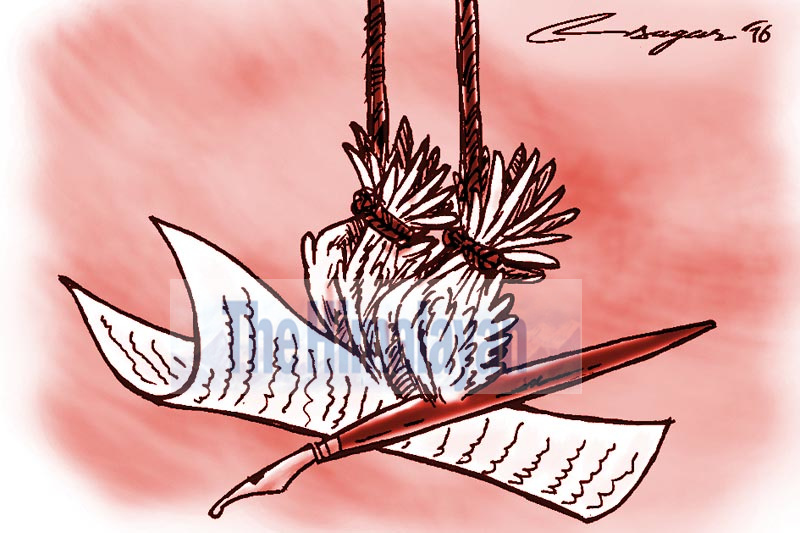Civil society denounces IT Bill, calls for scrapping it entirely
Kathmandu, January 10
The Information Technology Bill endorsed by the Parliamentary Development and Technology Committee on December 29 curtails freedom of expression guaranteed by the constitution and that the bill should be scrapped entirely, prominent members of the civil society, senior journalists and law professionals said at an interaction today.
Making a presentation on restrictive provisions of the Bill, constitution expert Bhimarjun Acharya said the bill contradicted the constitution and international treaties ratified by Nepal. “The bill is wrong from top to the bottom. It must be scrapped entirely,” he said.
According to Acharya, Section 115 of the Bill envisages constitution of ‘Information Technology Court’, including a legal expert as its chairperson, and IT and commerce experts as members. He said the constitution did not allow setting up of such a ‘kangaroo court’ as only the judicial court could look into matters related to criminal offence.
Acharya also pointed out flaws in the provision related to the court’s constitution. As per the Bill, the government can constitute the court through gazette notification, and the government can appoint its office bearers itself. Moreover, the tenure of the office bearers has been set five-years with the possibility of extension through government decision. “This means the office bearers are accountable to the government,” he said.
Referring to the Bill’s Section 96 (28 and 30) and Section 88, which have provisioned up to life sentence for crime against state, Acharya questioned how could an extra-judicial institution constituted by the government through gazette notification slap life sentence.
He also said there were various laws in the country criminalising crime against state, and that the IT Bill was not required for the same. “Existing laws are enough to make social media dignified,” he said.
According to Acharya, the Bill has ridiculous as well as dangerous provisions that the government could use to remove hurdles and to interpret the law. He said nowhere in the world where there’s constitutional supremacy, could the government interpret a law adopted by the sovereign parliament. “If the government forms a court itself, appoints office bearers itself, and prepares and interprets the law itself, no citizen will be safe in the country and there will be nothing called free speech,” Acharya said.
“It is a matter of shame the parliamentary committee has endorsed the Bill. This is because the Parliament is accountable to the government, and not the people.”
Advocate Tika Ram Bhattarai said despite some amendment to the Bill by the House committee, the Bill still had provisions that curtailed freedom of expression. He said the Bill also had several abstract provisions that were even more dangerous.
The speakers said one should not look at the IT Bill in isolation, but as part of a trend that began after the government banned demonstrations at Maitighar Mandala. They said bills related to the NHRC, the Media Council and Special Service, among others, suggested a ploy to systematically end freedom of expression.
Annapurna Post daily’s Editor Hari Bahadur Thapa said the government’s act of not prioritising formulation of various laws for the implementation of the constitution and federalism, and bringing bills that curtail freedom of expression spoke of its ill intentions. “This government will not rule the country forever. What if a more autocratic government took over the reins?” he questioned.
Thapa said the government was formulating regressive laws akin to those in the Panchayat era. “Now that the government has reversed all transformations, I request it to term all of us ‘anti-national elements’ as done by the Panchayat regime,” he said.
Senior journalist Kanak Mani Dixit said it was unfortunate that Nepal was debating freedom of expression at a time when the focus should have been on development. Stating that Nepali society enjoyed the highest degree of freedom in South Asia, few bills if enacted, would convert it to the least free society in the region.
Nepali Congress Whip Pushpa Bhusal said her party would never allow endorsement of such a bill by the Parliament. Stating that free press and human rights were the two major pillars of civil liberty, Bhusal said her party would do its bit to stop the bill in the parliament.
Senior journalist Harihar Birahi said the government was increasingly getting control freak, and if the government was allowed to continue with such activities, it would only become autocratic. “The sad part is that the parliament that should have checked the government’s such activities has become a rubber stamp,” he said. “IT Bill should not be amended but entirely scrapped.”






